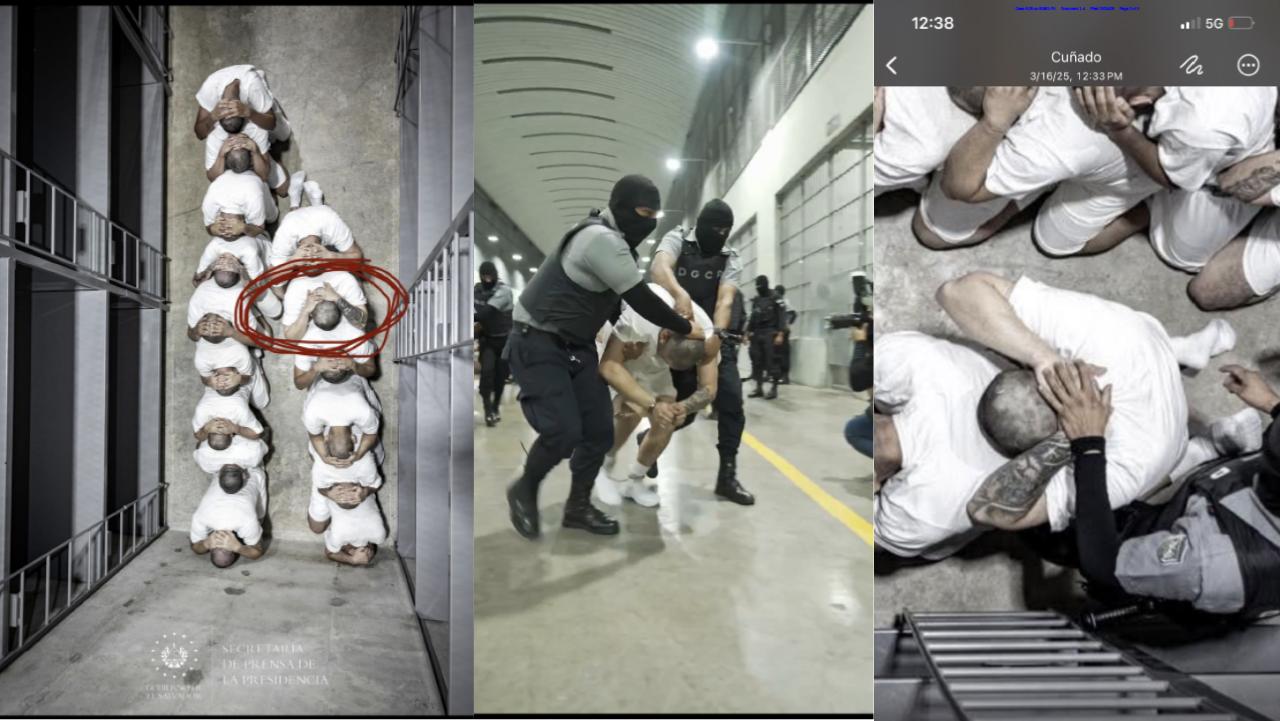US deports Maryland man in “administrative error” to El Salvador

Photos of Kilmar Armando Abrego Garcia in El Salvador's CECOT prison that his wife recognized him in. Submitted as Exhibit D of the initial lawsuit against the government. U.S. DISTRICT COURT FOR THE DISTRICT OF MARYLAND/ECF No. 1
GREENBELT, Md., April 19 (ZFJ) — U.S. immigration authorities have erroneously deported Kilmar Armando Abrego Garcia of Maryland, who was protected from removal by an immigration judge, to an El Salvador mega-prison.
Abrego Garcia’s case was brought before U.S. District Judge Paula Xinis at the Maryland federal court’s division in Greenbelt.
Xinis wrote in her memorandum opinion that Abrego Garcia came from Los Nogales, El Salvador, and illegally entered the U.S. after the Barrio gang subjected his family to “extortion and threats of death.”
In early 2019, the Prince George’s County Police Department arrested him and questioned him about gang affiliation. P.G. County police brought no charges against Abrego Garcia and turned him over to Immigration and Customs Enforcement (ICE), which began deportation proceedings against him.
Abrego Garcia applied for asylum, but on April 24, 2019, the Department of Homeland Security (DHS) “relied principally on a singular unsubstantiated allegation” that he was an MS-13 member to argue that he should be held in custody. An immigration judge agreed with DHS, and the Board of Immigration Appeals upheld the decision.
On October 10, 2019, after a full evidentiary hearing, an immigration judge granted Abrego Garcia withholding of removal, finding that “he was entitled to such protection because the Barrio 18 gang had been ‘targeting him and threatening him with death because of his family’s pupusa business.’” Pupusas are a griddle cake, often stuffed with ingredients, highly popular in El Salvador. DHS did not appeal the judge’s decision.
The district court found that Abrego Garcia had since fully cooperated with ICE, reported for annual check-ins, and was never charged with or convicted of any crime. However, on March 12, 2025, ICE agents abruptly arrested him, saying that his “status had changed.”
Three days later, without having seen a judge, ICE deported Abrego Garcia to El Salvador’s Terrorism Confinement Center (CECOT) under an agreement previously arranged with Salvadoran President Nayib Bukele for incarcerating deported people.
This supermax prison is a critical component of Bukele’s efforts to crack down on gang violence that has long plagued El Salvador. While his government has significantly improved safety, CECOT has been widely criticized for human rights violations, and many people suspect innocent people have been wrongfully imprisoned in the anti-gang campaign.
Abrego Garcia’s wife learned of his fate when she identified him in a news photo of people deported to El Salvador.
Justice Department attorney Erez Reuveni conceded in a court hearing that Abrego Garcia should not have been deported. A declaration by Robert L. Cerna, acting field office director of Enforcement and Removal Operations (ERO) at ICE’s Harlingen Field Office in Texas, told the court that an “administrative error” had occurred where Abrego Garcia had been mistakenly placed on the manifest of a deportation flight.
In a filing opposing the man’s return, the government asserted that Abrego Garcia was no longer in U.S. custody, meaning the district court would lack the jurisdiction to order the government to return him.
“Despite their allegations of continued payment for Abrego Garcia’s detention, Plaintiffs do not argue that the United States can exercise its will over a foreign sovereign,” wrote the Justice Department. “The most they ask for is a court order that the United States entreat—or even cajole—a close ally in its fight against transnational cartels.”
Judge Xinis granted a preliminary injunction against the government, ordering the U.S. to “facilitate and effectuate the return” of Abrego Garcia by midnight on Monday, April 7. She pushed back against the government’s “eye-popping proposition” that bringing him back was impossible.
“They do indeed cling to the stunning proposition that they can forcibly remove any person—migrant and U.S. citizen alike—to prisons outside the United States, and then baldly assert they have no way to effectuate return because they are no longer the ‘custodian,’ and the Court thus lacks jurisdiction.”
“To credit Defendants’ argument would permit the unfettered relinquishment of any person regardless of immigration status or citizenship to foreign prisons ‘for pennies on the dollar,’” wrote the judge.
Xinis concluded “this is not about Defendants’ inability to return Abrego Garcia, but their lack of desire.”
In response to the court’s questioning of why it was impossible to bring Abrego Garcia back, Reuveni replied, “When this case landed on my desk, the first thing I did was ask my clients that very question. I’ve not received, to date, an answer that I find satisfactory.”
“Defendants have not produced any order of removal as to Abrego Garcia, executed or otherwise, or submitted any proof that they had removed him pursuant to one,” pointed out Xinis.
White House officials continue to assert that Abrego Garcia is a member of MS-13 and that he was rightfully deported.
In response to a question on X, Vice President JD Vance wrote, “My comment is that according to the court document you apparently didn’t read he was a convicted MS-13 gang member with no legal right to be here. My further comment is that it’s gross to get fired up about gang members getting deported while ignoring citizens they victimize.”
The government appealed the district court’s order to return Abrego Garcia to the Supreme Court. Chief Justice John Roberts, the justice responsible for handling emergency docket cases from Maryland, suspended Xinis’ order on April 7 pending further hearings.
The federal case number is Civil Action No. 8:25-cv-00951-PX in the U.S. District Court for the District of Maryland. The Supreme Court docket number is No. 24A949.
References
- U.S. District Court for the District of Maryland (MDDC) - Abrego Garcia v. Noem (8:25-cv-00951-PX)
- ECF No. 11 - DEFENDANTS’ MEMORANDUM OF LAW IN OPPOSITION TO PLAINTIFFS’ EMERGENCY MOTION FOR TEMPORARY RESTRAINING ORDER - https://www.zfjnews.com/2025/domestic-affairs/D.Md._8_25-cv-00951-PX_11_0.pdf
- ECF No. 21 - ORDER GRANTING PRELIMINARY INJUNCTION - https://www.zfjnews.com/2025/domestic-affairs/D.Md._8_25-cv-00951-PX_21_0.pdf
- ECF No. 31 - MEMORANDUM OPINION - https://www.zfjnews.com/2025/domestic-affairs/D.Md._8_25-cv-00951-PX_31_0.pdf
- Supreme Court of the United States (SCOTUS) - KRISTI NOEM, SECRETARY, DEPARTMENT OF HOMELAND SECURITY, ET AL. v. KILMAR ARMANDO ABREGO GARCIA, ET AL. (No. 24A949)
